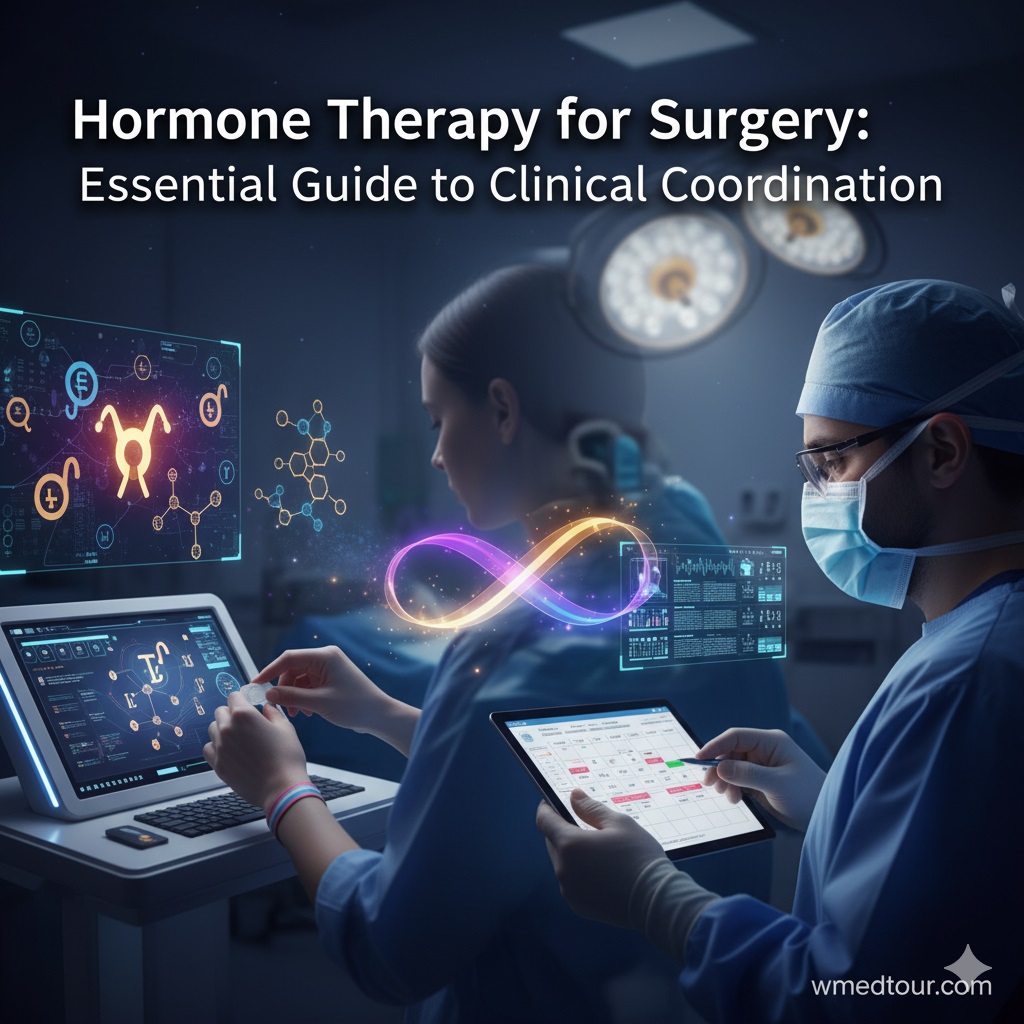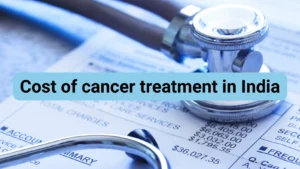Hormone Therapy for Intersex Surgery: Essential Guide to Clinical Coordination
Seamlessly Integrating Hormonal and Surgical Care for Optimal Outcomes
Executive Summary: Key Takeaways
Optimizing Hormone Therapy for Surgery is not merely a clinical footnote—it’s essential to achieving successful surgical and long-term health outcomes, particularly in gender-affirming care (GAC) and certain endocrine-related procedures. Pre-operative hormone therapy management can optimize tissue for surgery, minimize complications, and ensure patient safety. Post-operative hormone therapy is vital for maintaining secondary sex characteristics and overall bone and mental health, especially after the removal of natural hormone-producing organs. Effective coordination demands clear communication between the endocrinologist and the surgeon to manage risks like blood clots (VTE) and ensure a smooth transition of care. This guide focuses on safe hormone therapy for surgery protocols.
Who is This For?
This guide is crafted for individuals undergoing or planning gender-affirming surgeries (GAS/GCS), intersex individuals receiving gonadectomy or reconstructive procedures, and the medical professionals—surgeons, endocrinologists, and primary care providers—responsible for their integrated care. Understanding the critical interplay of Hormone Therapy for Surgery is key to a safe and successful patient journey.
Pre-Operative Hormone Therapy Management: The Strategic Pause
Pre-operative Hormone Therapy for Surgery planning is primarily aimed at minimizing surgical risks, especially the potential for venous thromboembolism (VTE—blood clots). This strategic pause is a standardized safety protocol, not a clinical necessity for surgical results in all cases, but highly recommended, especially for estrogen-based therapies.
The Estrogen Protocol: Preparing for Feminizing Surgery
Estrogen therapy, particularly oral estrogen, is associated with an increased risk of blood clots. Therefore, patients are almost universally advised to stop estrogen therapy before major surgery. Generally, a pause of 2 to 4 weeks pre-operatively is standard practice across major surgical centers globally (Source 1).
Pros & Cons of Pre-Op Estrogen Cessation
- Pros: Significantly reduces the risk of VTE (DVT/PE), which can be fatal. Surgeons require this pause to meet safety standards.
- Cons: Can lead to temporary mood swings, hot flashes, and discomfort as hormone levels drop (known as “withdrawal” symptoms). The patient must coordinate this strictly with the surgical date.
The Testosterone Protocol: Planning for Masculinizing Surgery
Testosterone therapy, unlike estrogen, is generally not required to be stopped prior to surgery, except in cases of known polycythemia (abnormally high red blood cell count). However, it is always imperative to confirm the protocol with your specific surgeon, as institutional guidelines can vary.
Pros & Cons of Pre-Op Testosterone Use
- Pros: Maintains hormone stability, avoiding the discomfort and psychological stress of withdrawal. No increased risk of VTE attributed solely to injectable/topical testosterone at therapeutic doses (Source 2).
- Cons: If blood levels are too thick (polycythemia), testosterone must be temporarily stopped or dosage adjusted until the blood is thinned to safe levels.
Post-Operative Hormone Therapy Resumption: Safety and Stability
The goal post-surgery is to safely re-establish optimal hormone levels to aid recovery, prevent osteoporosis, and maintain the patient’s desired secondary sex characteristics. The timing of resuming hormone therapy for surgery protocols is a critical aspect of clinical coordination.
Resuming Estrogen (After a VTE Pause)
After surgery, the risk of VTE remains elevated due to immobilization and the inflammatory response to surgery itself. Consequently, restarting estrogen is typically delayed until the patient is mobile and the highest VTE risk period has passed—usually 2 to 4 weeks post-operatively. Many endocrinologists prefer to resume therapy using transdermal patches or gels initially, as these forms are believed to have a lower VTE risk than oral pills (Source 3).
Resuming Testosterone (After Gonadectomy)
When the gonads are removed (e.g., orchiectomy or oophorectomy), the body’s natural hormone source is eliminated. If the patient was already on testosterone, they usually resume the hormone shortly after surgery—often within a few days to a week—as there is no VTE risk associated with testosterone itself. Resumption is critical to prevent the symptoms of hormone deficiency.
Comparison of Pre-Operative Protocols for Hormone Therapy for Surgery
| Hormone Type | Recommended Pre-Op Action | Duration of Pause | Reason |
|---|---|---|---|
| Oral Estrogen | Stop | 2-4 Weeks | Elevated VTE (Blood Clot) Risk |
| Transdermal Estrogen | Consult (Often Stop for 2 Weeks) | 0-2 Weeks | Lower VTE risk, but surgeon preference often dictates a pause. |
| Testosterone | Continue (Unless Polycythemia) | None (Unless Blood Thinning Needed) | Minimal VTE risk; avoids deficiency symptoms. |
Case Study: Sarah’s Coordinated Journey
Managing Estrogen Before and After Vaginoplasty
Sarah, 32, was scheduled for a vaginoplasty, a major surgery often requiring long periods of reduced mobility. Sarah had been on oral estradiol for three years. Knowing the crucial nature of Hormone Therapy for Surgery, her surgeon mandated a four-week pause of her oral estrogen to reduce the risk of a dangerous blood clot during or immediately after the procedure.
The Plan: Her endocrinologist meticulously timed the cessation and coordinated with the surgical team. Four weeks before the date, Sarah stopped the oral estrogen and experienced temporary hot flashes. Post-surgery, she was kept on low-dose anticoagulants. The surgical team allowed her to resume hormone therapy three weeks post-op, but switched her initially to a transdermal patch (lower VTE risk) for two months before transitioning her back to her oral regimen. This highly coordinated approach ensured maximum safety for Sarah while managing her transition back to her preferred hormone therapy for surgery protocol safely.
This careful planning is why seeking care from experienced, coordinated teams—whether domestically or abroad—is essential. You must always confirm the specific VTE protocol with your surgical team before making travel plans (see our travel checklist).
Clinical Coordination and Long-Term Health After Hormone Therapy for Surgery
Effective coordination of Hormone Therapy for Surgery goes beyond the immediate surgical period. For individuals who have had a total gonadectomy (removal of ovaries or testes), lifelong hormone replacement therapy (HRT) is usually necessary to maintain health.
Why Post-Op Hormones are Non-Negotiable
Without the primary organs producing sex hormones, individuals are at risk for conditions typically associated with post-menopausal or pre-pubertal hormone levels, including osteoporosis (bone weakening) and cardiovascular problems. Furthermore, HRT plays a vital role in psychological well-being. Therefore, ongoing, monitored hormone therapy is a fundamental part of the post-operative plan after these surgeries. Patients planning permanent procedures must discuss hormone therapy for surgery and its lifelong implications with their care team, including specialists in oncology or gynecological surgery when relevant.
For more on surgical planning, consider reading our guides on different surgical types and the ethical aspects of care (Source 4). We also advise reviewing our guide on legal aspects of surgery when considering treatment abroad.
Frequently Asked Questions (FAQs) on Hormone Therapy for Surgery
1. Why do I need to stop estrogen before surgery, but not testosterone?
Answer: Oral estrogen significantly increases the liver’s production of clotting factors, raising the risk of VTE. Testosterone, at typical therapeutic doses, does not carry this specific, high-risk clotting pathway.
2. What are the signs of a blood clot I should watch for post-op?
Answer: Watch for severe leg pain, swelling, redness (Deep Vein Thrombosis – DVT), or sudden shortness of breath, chest pain, and rapid heartbeat (Pulmonary Embolism – PE). Seek immediate emergency care if these occur.
3. Will stopping hormones affect my surgery results?
Answer: No. The temporary pre-op pause is for safety, not for tissue preparation. The long-term effects of hormones on tissue are already established by the time surgery is planned.
4. Can I restart my hormones the day I get home?
Answer: Usually no. You must follow the precise instructions from your surgical team and endocrinologist, which typically involve a delay of 2 to 4 weeks for estrogen, and possibly a few days for testosterone, depending on the procedure.
5. Is a hormone patch safer than a pill after surgery?
Answer: Many specialists believe transdermal (patch/gel) estrogen is safer post-op because it bypasses the liver, reducing the creation of pro-clotting proteins. This is a common strategy for resuming Hormone Therapy for Surgery protocols.
6. What happens if I forget to stop my hormones before surgery?
Answer: Immediately notify your surgical team. The surgery will almost certainly be postponed to ensure you complete the required safety pause, as operating during the high-risk window is extremely dangerous.
7. Do I need to be on hormones before top surgery (mastectomy) as a transgender man?
Answer: No, it’s not clinically mandatory, but many surgeons prefer it because testosterone can redistribute fat and help develop chest muscle, leading to a better surgical contour. Consult our guide on mastectomy options.
8. How soon after surgery should I see my endocrinologist?
Answer: Schedule a check-up within the first 1-2 months post-op to manage hormone re-initiation, check blood work, and adjust dosage based on the new hormonal baseline (especially after gonadectomy).
9. Can hormone therapy reduce swelling after surgery?
Answer: No. Hormones do not typically manage localized surgical swelling. That is managed with compression garments, rest, and anti-inflammatory drugs. You can consult our plastic surgery recovery guides.
10. How will my hormone dosage change if I have a gonadectomy?
Answer: Your dosage may decrease, or your delivery method may change. Your natural hormone source is gone, so the goal is to fully replace the body’s needs via HRT, often resulting in lower overall doses compared to when your gonads were still producing hormones.
11. What if I am undergoing surgery for a condition like breast cancer?
Answer: In oncology, the role of hormones is different. Endocrine therapy may be stopped or changed based on the cancer type (e.g., hormone receptor-positive). This requires separate, highly specialized coordination with your oncologist and surgeon (Source 5).
12. How does the concept of Hormone Therapy for Surgery apply to orthopedic surgeries?
Answer: For non-gender-related surgeries, hormone use (especially estrogen) is also a VTE risk factor. Patients undergoing procedures like total knee replacement are typically advised on the same temporary pause protocol to prevent blood clots.
Essential Resources and Next Steps
Navigating the complex interplay of Hormone Therapy for Surgery requires continuous education and clear planning. Use the links below to deepen your understanding and coordinate your care:
- Vetting Your Team: Choosing a Surgeon/Clinic Abroad Checklist
- Understanding Surgical Risks: Cardiac Checkup and Diagnostic Procedures
- Hormonal Health Check: Comprehensive Health Checkup
- Managing Surgical Recovery: Tummy Tuck Before and Aftercare (Principles of post-op care apply broadly)
- Global Safety Standards: Complete Legal Medical Travel Guide: Global Regulations
- Related Urological Surgery: Prostatectomy
- Hair and Hormones: Hair Maintenance After Transplant (Hormones affect hair growth)
- Understanding Costs: Cost vs. Quality: Global Price Comparison
- Gynecological Surgery Department
- Urological Surgery Department
- Genital Cosmetic Surgery
- Body Plastic Surgery
- Breast Plastic Surgery
- Orchiectomy
- Oophorectomy
- Mastectomy
- Total Elbow Replacement
- Total Hip Replacement




